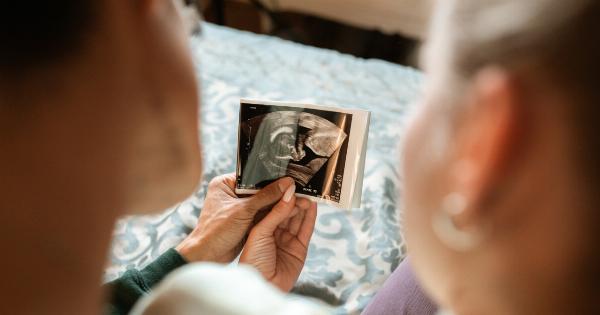Hemorrhoids, also known as piles, are a common condition that affects many women during pregnancy. They occur when the blood vessels in the rectal area become swollen and inflamed, causing discomfort and pain.
While hemorrhoids can occur in anyone, they are more prevalent during pregnancy due to various factors such as increased blood volume and pressure on the pelvic area. In this article, we will discuss the causes, treatment, and prevention of hemorrhoids during pregnancy.
Causes of Hemorrhoids During Pregnancy
There are several reasons why pregnant women are more prone to developing hemorrhoids. These include:.
- Increased blood volume: During pregnancy, a woman’s blood volume increases significantly to support the growth and development of the fetus. This increased blood flow can cause veins to swell and lead to hemorrhoids.
- Hormonal changes: Hormonal changes during pregnancy can weaken the walls of the blood vessels, making them more susceptible to swelling and inflammation.
- Pressure on the pelvic area: As the uterus expands to accommodate the growing baby, it puts pressure on the pelvic area and the blood vessels within, leading to hemorrhoids.
- Constipation: Pregnancy hormones can slow down the digestion process and cause constipation, which contributes to the development of hemorrhoids.
- Straining during bowel movements: Straining during bowel movements, often caused by constipation, can aggravate existing hemorrhoids or lead to the formation of new ones.
Treatment Options for Hemorrhoids During Pregnancy
Managing hemorrhoids during pregnancy involves various treatment options to alleviate symptoms and promote healing. It is always recommended to consult with a healthcare professional before starting any treatment. Some common treatment options include:.
1. Lifestyle Modifications
Simple lifestyle changes can make a big difference in managing hemorrhoids during pregnancy:.
- Eat a high-fiber diet to prevent constipation.
- Stay hydrated and drink plenty of water.
- Avoid sitting or standing for long periods; take breaks and move around.
- Practice good hygiene by keeping the anal area clean and dry.
2. Topical Medications
There are several over-the-counter (OTC) creams, ointments, and suppositories available that can provide relief from itching, pain, and inflammation associated with hemorrhoids.
It is essential to choose products specifically labeled as safe for use during pregnancy and follow the instructions carefully.
3. Warm Baths
Sitting in a warm tub for 15-20 minutes a few times a day can soothe the discomfort caused by hemorrhoids. Adding Epsom salt to the water can also help reduce inflammation and promote healing.
4. Cold Compresses
Applying a cold compress or ice pack to the affected area can reduce swelling and provide temporary relief from pain and itching. It is crucial to wrap the ice pack in a clean cloth to avoid direct contact with the skin.
5. Sitz Baths
Sitz baths are shallow baths that cover only the hips and buttocks area. They can be taken using a specially designed basin that fits over the toilet seat or by sitting in a bathtub filled with a few inches of warm water.
Sitz baths help clean the area and promote healing.
6. Medications
In some cases, healthcare providers may prescribe medications such as stool softeners or fiber supplements to help alleviate constipation and prevent straining during bowel movements.
It is crucial to discuss the safety of any medication with a healthcare professional before use.
7. Hemorrhoid Banding
If conservative measures fail to provide relief, a healthcare provider may recommend a procedure called hemorrhoid banding.
This procedure involves placing small bands around the base of the hemorrhoids, cutting off their blood supply, and causing them to shrink and fall off. Hemorrhoid banding is typically performed in a healthcare setting and is considered safe during pregnancy.
Prevention of Hemorrhoids During Pregnancy
While hemorrhoids may not be entirely preventable during pregnancy, certain measures can help reduce the risk and alleviate symptoms:.
1. Maintain a Healthy Diet
Aim to consume a well-balanced diet that includes plenty of fiber-rich foods such as fruits, vegetables, whole grains, and legumes. Adequate fiber intake can prevent constipation and promote regular bowel movements.
2. Stay Hydrated
Drinking an adequate amount of water throughout the day can help soften the stool and prevent constipation.
3. Exercise Regularly
Engaging in regular physical activity can stimulate bowel movements, improve digestion, and prevent constipation. Consult with a healthcare professional for suitable exercises during pregnancy.
4. Avoid Straining
Avoid straining during bowel movements by responding to the natural urge to go. If needed, try using a small stool or step to elevate the feet while sitting on the toilet, as this can help facilitate proper bowel movements.
5. Manage Weight Gain
Manage weight gain within the recommended guidelines to avoid putting excessive pressure on the pelvic area and minimize the risk of developing hemorrhoids.
6. Practice Good Hygiene
Keep the anal area clean and dry by gently patting it after each bowel movement. Avoid using rough toilet paper and opt for moistened wipes or a bidet for gentler cleaning.
7. Be Mindful of Lifting Heavy Objects
Avoid lifting heavy objects, as it can strain the pelvic area and increase the risk of developing hemorrhoids.
8. Manage Stress
Stress can contribute to digestive issues and constipation. Find healthy ways to manage stress, such as relaxation techniques, exercise, or seeking support from loved ones.
9. Sleep on Your Side
Sleeping on your side, preferably the left side, improves blood circulation and reduces pressure on the pelvic area.
Conclusion
Hemorrhoids are a common discomfort experienced by many women during pregnancy.
While they can be bothersome, managing and treating hemorrhoids is possible with various lifestyle modifications, over-the-counter treatments, and, in some cases, medical procedures. By incorporating preventive measures and adopting healthy habits, pregnant women can minimize the occurrence and severity of hemorrhoids.
If symptoms persist or worsen, it is important to consult with a healthcare professional for further guidance and treatment.































